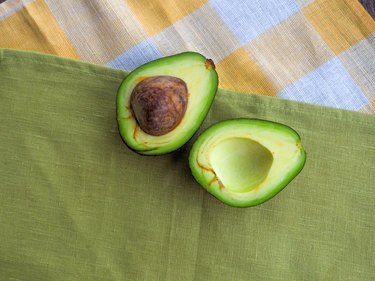
Avocados come in all beautiful shapes and sizes — we don't discriminate. Regardless of whether they're in guacamole or on toast, extra large or extra small, avocados make for a nutritious and delicious snack.
But while they're certainly good for your health, avocados are calorie-dense and should be consumed mindfully. It's very easy to overeat this creamy, dreamy fruit (yes, it's a fruit!), so consider these small avocado nutrition facts before you dig in.
Video of the Day
Video of the Day
Read more: How Much Fat or Calories Are in a Raw Avocado
The Number of Calories in a Small Avocado
An average-sized avocado, without the seed and skin, weighs about 150 grams (just over five ounces) and packs in 240 calories, according to the USDA. Depending on the size of the fruit, the calories in one small avocado will vary but generally fall below the 227 calorie mark. According to the USDA, one mini grocery store avocado packs in 160 calories and 15 grams of fat.
The recommended serving of avocado (mini avocados included) is about 50 grams, which is about a third of an average-sized fruit and about half of a small avocado. That means a single serving of a mini avocado comes in at about 53 calories and 5 grams of fat.
Small Avocado Nutrition Basics
Avocados are best known for their high healthy fat content. They're packed with monounsaturated fats, which may help decrease your risk of heart disease, according to the Academy of Nutrition and Dietetics. Avocados also contain polyunsaturated fats, which may help lower LDL or "bad" cholesterol, according to the U.S. National Library of Medicine.
Not only do avocados provide healthy fats (which help with weight management), they're also packed with key nutrients, such as vitamins E and C, dietary fiber and folate, according to the Academy of Nutrition and Dietetics. Folate, one of the B vitamins, is crucial for making red and white blood cells, according to the National Institutes of Health.
Vitamins E and C, known for their immune system-boosting properties, are crucial for your body's ability to metabolize and process protein, according to the National Institutes of Health. In other words, these vitamins help your body convert protein from food into protein your body can use! Both vitamins E and C are important antioxidants, which may help reduce inflammation, according to the Mayo Clinic.
And the benefits don't end there! Avocados are typically regarded as a weight-loss-friendly food due to their high fiber content. Fiber slows the rate at which your body breaks down food, according to the Academy of Nutrition and Dietetics, which helps you feel full for longer. In other words, eating some avocado can help ward off the munchies.
Read more: Risks of Eating Too Much Avocado
Was this article helpful?
150 Characters Max
0/150
Thank you for sharing!
Thank you for your feedback!